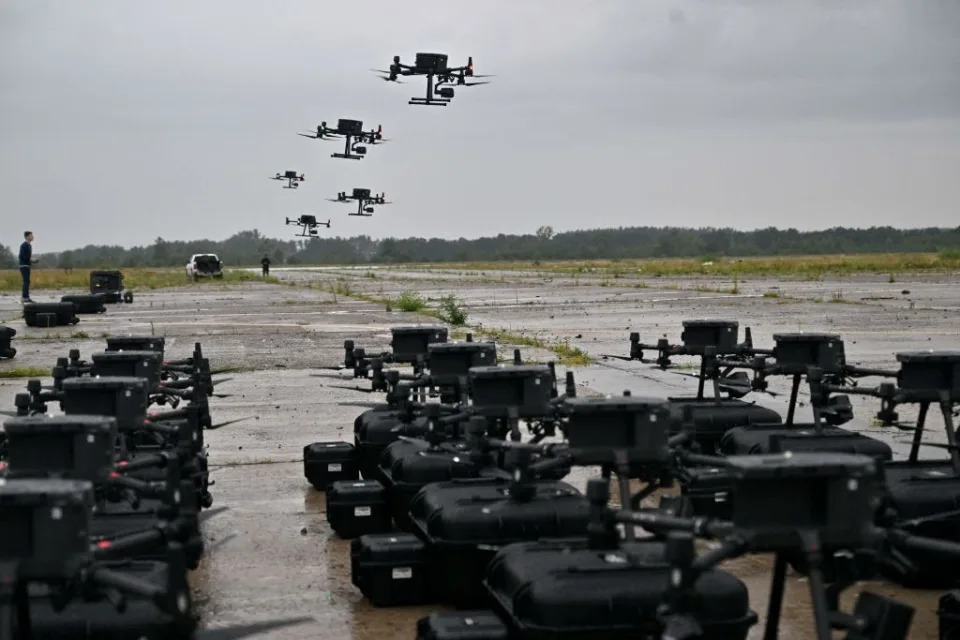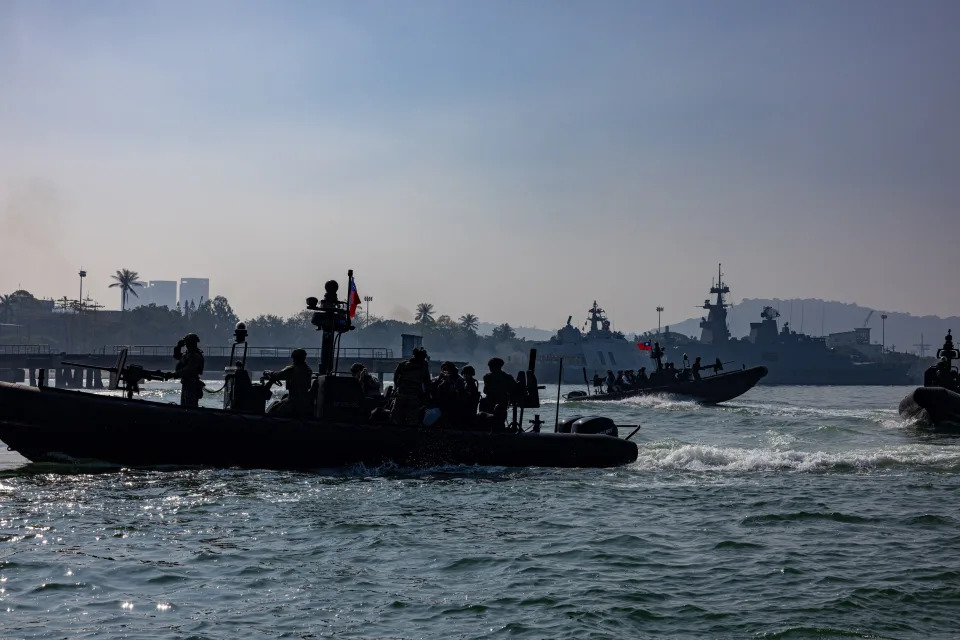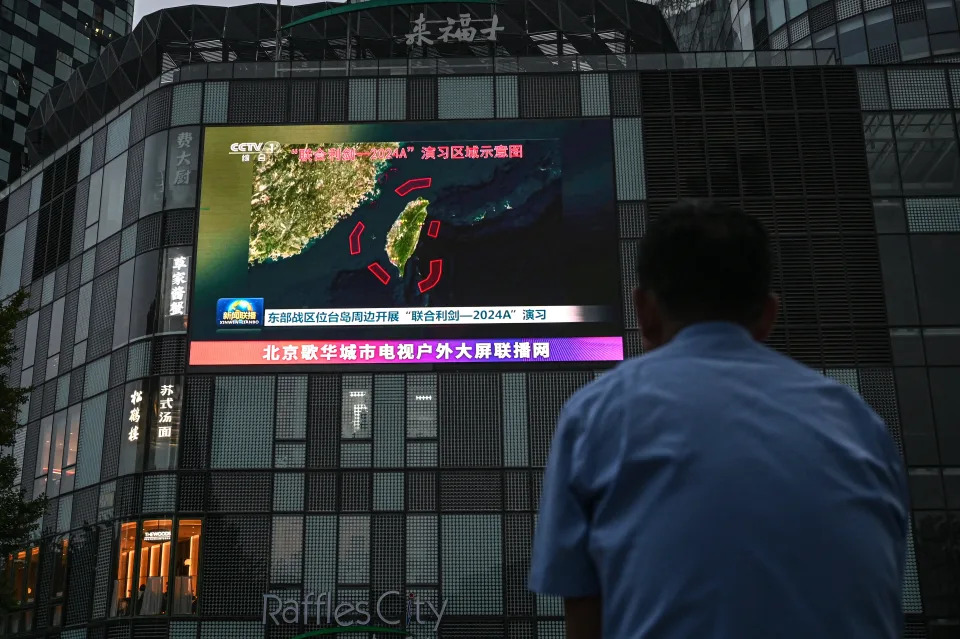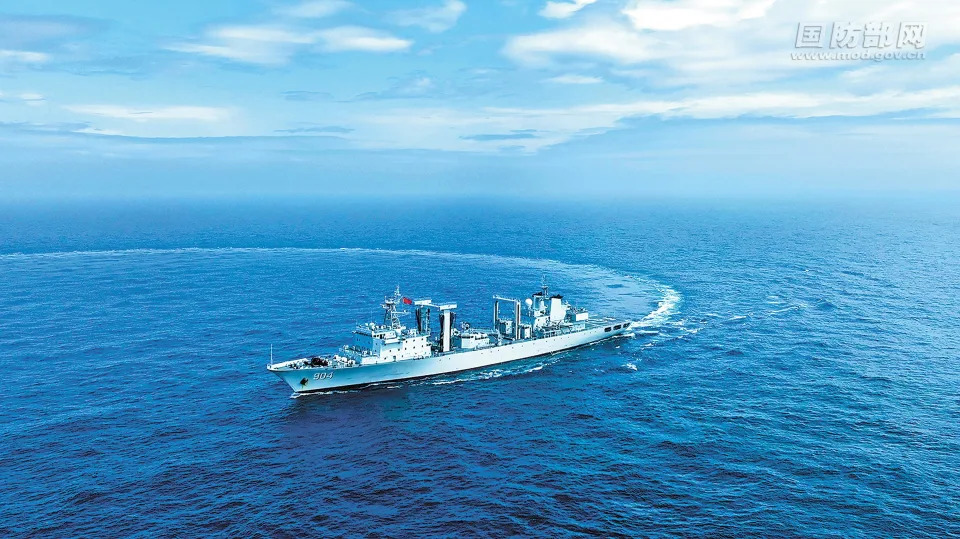WWIII
The US military has a plan to turn the Taiwan Strait into an 'unmanned hellscape' if China invades, top admiral saysChris Panella
Mon, June 10, 2024
The US has plans to employ thousands of drones if China invades Taiwan, the top US admiral in the Pacific said.
The "unmanned hellscape" would buy the US time to come to the aid of Taiwan, he added.
China's drills around the island last month raised questions about what a blockade or invasion would look like.
If China invades Taiwan, it may face a large, lethal drone force meant to make its military "miserable."
At least that's the plan, according to the top US admiral in the Pacific, who said the "Hellscape" strategy is designed to distract China and buy the US time to respond.
"I want to turn the Taiwan Strait into an unmanned hellscape using a number of classified capabilities," Adm. Samuel Paparo, the commander of US Indo-Pacific Command, told The Washington Post at the International Institute for Strategic Studies' Shangri-La Dialogue Summit.
In doing so, he said, "I can make their lives utterly miserable for a month, which buys me the time for the rest of everything."
The plan involves launching thousands of unmanned systems, from surface vessels and submarines to aerial drones, to fight Chinese invading forces as soon as they begin to cross the Taiwan Strait, effectively acting as a kind of first line of defense.
This type of strategy would require heavy investments in cheap, reliable drones, which the US has been doing with its Replicator initiative. Last year, the Department of Defense officially announced the program, which is a long-term plan to field thousands of autonomous systems.

DJI Matrice 300 reconnaissance drones, bought in the frame of program 'The Army of Drones' are seen during test flights in the Kyiv region on August 2, 2022, prior to being sent to the front line.
SERGEI SUPINSKY/AFP via Getty Images
While progress on the ambitious plan has been relatively quiet, there have been some signs of movement.
Back in March, Deputy Defense Secretary Kathleen Hicks said the Pentagon aims to spend $1 billion this fiscal year on Replicator. A few capabilities have been highlighted as necessary for the first drones in the program, and the Pentagon is working with defense partners to develop and acquire these systems.
Last summer, Hicks said Replicator aimed to counter China's "biggest advantage," which is its mass: "More ships. More missiles. More people." She said that "we'll counter the [People's Liberation Army's] mass with mass of our own, but ours will be harder to plan for, harder to hit, harder to beat."
The previous INDOPACOM commander said last year that US unmanned capabilities "will be an asymmetric advantage." He said "operational concepts that we are working through are going to help amplify our advantages in this theater," adding, "There's a term, hellscape, that we use."
Paparo's remarks on the "Hellscape" strategy come on the heels of a massive Chinese military drill around Taiwan, during which it effectively surrounded the island and showed off joint force capabilities.
While the exercise showed Taiwan and the US how quickly and easily China could employ a blockade, it was also a learning opportunity for the US military.
After the drills concluded, Paparo said they "looked like a rehearsal" for an invasion, telling Japan's Nikkei newspaper: "We watched it. We took note. We learned from it. And they helped us prepare for the future."
China just showed how easily one of its massive drills around Taiwan could escalate into something worse
While progress on the ambitious plan has been relatively quiet, there have been some signs of movement.
Back in March, Deputy Defense Secretary Kathleen Hicks said the Pentagon aims to spend $1 billion this fiscal year on Replicator. A few capabilities have been highlighted as necessary for the first drones in the program, and the Pentagon is working with defense partners to develop and acquire these systems.
Last summer, Hicks said Replicator aimed to counter China's "biggest advantage," which is its mass: "More ships. More missiles. More people." She said that "we'll counter the [People's Liberation Army's] mass with mass of our own, but ours will be harder to plan for, harder to hit, harder to beat."
The previous INDOPACOM commander said last year that US unmanned capabilities "will be an asymmetric advantage." He said "operational concepts that we are working through are going to help amplify our advantages in this theater," adding, "There's a term, hellscape, that we use."
Paparo's remarks on the "Hellscape" strategy come on the heels of a massive Chinese military drill around Taiwan, during which it effectively surrounded the island and showed off joint force capabilities.
While the exercise showed Taiwan and the US how quickly and easily China could employ a blockade, it was also a learning opportunity for the US military.
After the drills concluded, Paparo said they "looked like a rehearsal" for an invasion, telling Japan's Nikkei newspaper: "We watched it. We took note. We learned from it. And they helped us prepare for the future."
China just showed how easily one of its massive drills around Taiwan could escalate into something worse
Chris Panella
INSIDER
Tue, June 11, 2024
China conducted massive drills around Taiwan last month, surrounding the island.
It demonstrated how easily China can launch a drill with little to no warning.
These exercises could easily escalate.
Last month, China conducted large-scale military exercises around Taiwan with the intent to send a message.
As elements of the Chinese joint force surrounded the island democracy for the two-day event, it became clear how easily one of these massive drills could escalate into conflict, giving China the ability to launch a blockade or quarantine of the island with little to no warning.
The Chinese armed forces have been able to "essentially start mounting an increased tempo of these large-scale drills that have a lot of the makings of a blockade," Tom Shugart, a former US Navy officer and current adjunct senior fellow at the Center for a New American Security think tank, said.
He added that the May exercise showed that China's fleet "is very well suited" for a blockade or quarantine of Taiwan.
The Department of Defense has identified a blockade as a possibility, noting in its most recent report on the Chinese military that "PLA writings describe a Joint Blockade Campaign in which the PRC would employ blockades of maritime and air traffic, including a cut-off of Taiwan's vital imports, to force Taiwan's capitulation."
If effectively executed, such action would potentially have immediate and dire consequences for Taiwan's economy, cutting off its trade and shipping. Such a move could force its military into action without necessarily triggering a military response from the US and its allies, possibly leaving it to stand alone.
After the most recent Chinese military drills, US Indo-Pacific Commander Adm. Samuel Paparo said the US observed the exercises closely, learning from them and assessing that they "looked like a rehearsal" for a military action against Taiwan.
There has long been speculation that the US would respond with force to a Chinese invasion of Taiwan, but the US response in the case of a blockade or quarantine, actions short of an amphibious assault, remains unclear.

The Taiwan M109 speed boats maneuver on the sea during a military drill on January 31, 2024, in Kaohsiung, Taiwan.Annabelle Chih/Getty Images
China's recent exercise "Joint Sword" focused on "joint sea-air combat readiness patrols, joint seizure of comprehensive battlefield control, and joint precision strikes on key targets," according to Chinese state media reports. The training included mock strikes by fighter jets with live ammunition and drills with various naval vessels, including frigates and destroyers.
The exercise appeared similar, in many respects, to the drills in April 2023 and notably tamer than the August 2022 drills, which occurred after then-US Speaker of the House Nancy Pelosi visited Taiwan. The latest exercise lasted only two days compared to seven.
And the Chinese-declared zones for May's drills were also only along the edges of Taiwan's contiguous zone, compared to the 2022 drills, which featured large exclusion zones that crossed into Taiwan's airspace and waters. During those exercises, China also fired missiles over the island, a highly provocative action.
Yet the latest exercise came with almost no warning, suggesting China can continue conducting such drills surrounding Taiwan at its leisure and prepare for and launch them with minimal notice.
"This is less a distinct operation and more just a step up in tempo," Mick Ryan, a retired Australian major general and strategist focusing on evolutions in warfare, told BI.
"What this shows us," Ryan said, "is that they have an ongoing operation which they can kind of turn the temperature up and down on with more fidelity now than they have been able to previously."

An outdoor screen shows a news coverage of China's military drills around Taiwan, in Beijing on May 23, 2024.JADE GAO/AFP via Getty Images
That would help China, were it to suddenly pursue a more aggressive course, maintain the element of surprise, which its war doctrine emphasizes as a key component of its fighting plans.
By increasing the frequency of and normalizing its military presence around Taiwan, China is adopting what experts and military officials, including retired Adm. John Aquilino, the former head of US INDOPACOM, have referred to as a "boiling frog" strategy.
The strategy essentially involves stepping up and maintaining aggression in the area so that the critical point when China actually decides to enact a blockade or quarantine is less discernible.
Such an event would be an act of war, but it still leaves the US and its allies in an odd place, weighing options as to how to respond, especially if it is short of large-scale violence.
Think tanks have played out war games of different Taiwan invasion scenarios, some of which have resulted in heavy losses for US, Japanese, and South Korean forces, as well as China's military. An all-out invasion isn't the only option though, as the recent drills demonstrated.
"The exercise really highlights the vulnerability of Taiwan to a lot of other scenarios than just invasion," Shugart said, noting that regardless of when or if one of these large drills transitions into a blockade, the most concerning issues are how easily that could occur and how China continues to use its military presence to create a new normal in the area.

A screen grab captured from a video shows the Chinese People's Liberation Army's Eastern Theater Command launching large-scale joint military exercises around Taiwan with naval vessels and military aircraft in China on May 24, 2024.Gui Xinhua/PLA/China Military/Anadolu via Getty Images
And within that new norm, China could create a situation in which Taiwan, exhausted and overwhelmed, is fractured, its resolve ultimately degraded.
Per a report published last month by war experts from the American Enterprise Institute and the Institute for the Study of War, an aggressive Chinese coercion campaign — short of war and more likely than a full-scale invasion — would involve boosting the Chinese military presence and pressure around Taiwan and possibly even a blockade or quarantine.
The report asserted that the US is ill-equipped for such an event, instead overly preoccupied with preparing for a potential amphibious assault, and that "Taiwan is strategically vital to the larger US-led coalition to contain" China, arguing that a "US-friendly Taiwan links America's allies in the northwestern Pacific with US partners and allies to the south."
However, a China-controlled Taiwan "would become a springboard for further PRC aggression and would seriously compromise the US-led coalition's ability to operate cohesively."
Tue, June 11, 2024
China conducted massive drills around Taiwan last month, surrounding the island.
It demonstrated how easily China can launch a drill with little to no warning.
These exercises could easily escalate.
Last month, China conducted large-scale military exercises around Taiwan with the intent to send a message.
As elements of the Chinese joint force surrounded the island democracy for the two-day event, it became clear how easily one of these massive drills could escalate into conflict, giving China the ability to launch a blockade or quarantine of the island with little to no warning.
The Chinese armed forces have been able to "essentially start mounting an increased tempo of these large-scale drills that have a lot of the makings of a blockade," Tom Shugart, a former US Navy officer and current adjunct senior fellow at the Center for a New American Security think tank, said.
He added that the May exercise showed that China's fleet "is very well suited" for a blockade or quarantine of Taiwan.
The Department of Defense has identified a blockade as a possibility, noting in its most recent report on the Chinese military that "PLA writings describe a Joint Blockade Campaign in which the PRC would employ blockades of maritime and air traffic, including a cut-off of Taiwan's vital imports, to force Taiwan's capitulation."
If effectively executed, such action would potentially have immediate and dire consequences for Taiwan's economy, cutting off its trade and shipping. Such a move could force its military into action without necessarily triggering a military response from the US and its allies, possibly leaving it to stand alone.
After the most recent Chinese military drills, US Indo-Pacific Commander Adm. Samuel Paparo said the US observed the exercises closely, learning from them and assessing that they "looked like a rehearsal" for a military action against Taiwan.
There has long been speculation that the US would respond with force to a Chinese invasion of Taiwan, but the US response in the case of a blockade or quarantine, actions short of an amphibious assault, remains unclear.

The Taiwan M109 speed boats maneuver on the sea during a military drill on January 31, 2024, in Kaohsiung, Taiwan.Annabelle Chih/Getty Images
China's recent exercise "Joint Sword" focused on "joint sea-air combat readiness patrols, joint seizure of comprehensive battlefield control, and joint precision strikes on key targets," according to Chinese state media reports. The training included mock strikes by fighter jets with live ammunition and drills with various naval vessels, including frigates and destroyers.
The exercise appeared similar, in many respects, to the drills in April 2023 and notably tamer than the August 2022 drills, which occurred after then-US Speaker of the House Nancy Pelosi visited Taiwan. The latest exercise lasted only two days compared to seven.
And the Chinese-declared zones for May's drills were also only along the edges of Taiwan's contiguous zone, compared to the 2022 drills, which featured large exclusion zones that crossed into Taiwan's airspace and waters. During those exercises, China also fired missiles over the island, a highly provocative action.
Yet the latest exercise came with almost no warning, suggesting China can continue conducting such drills surrounding Taiwan at its leisure and prepare for and launch them with minimal notice.
"This is less a distinct operation and more just a step up in tempo," Mick Ryan, a retired Australian major general and strategist focusing on evolutions in warfare, told BI.
"What this shows us," Ryan said, "is that they have an ongoing operation which they can kind of turn the temperature up and down on with more fidelity now than they have been able to previously."

An outdoor screen shows a news coverage of China's military drills around Taiwan, in Beijing on May 23, 2024.JADE GAO/AFP via Getty Images
That would help China, were it to suddenly pursue a more aggressive course, maintain the element of surprise, which its war doctrine emphasizes as a key component of its fighting plans.
By increasing the frequency of and normalizing its military presence around Taiwan, China is adopting what experts and military officials, including retired Adm. John Aquilino, the former head of US INDOPACOM, have referred to as a "boiling frog" strategy.
The strategy essentially involves stepping up and maintaining aggression in the area so that the critical point when China actually decides to enact a blockade or quarantine is less discernible.
Such an event would be an act of war, but it still leaves the US and its allies in an odd place, weighing options as to how to respond, especially if it is short of large-scale violence.
Think tanks have played out war games of different Taiwan invasion scenarios, some of which have resulted in heavy losses for US, Japanese, and South Korean forces, as well as China's military. An all-out invasion isn't the only option though, as the recent drills demonstrated.
"The exercise really highlights the vulnerability of Taiwan to a lot of other scenarios than just invasion," Shugart said, noting that regardless of when or if one of these large drills transitions into a blockade, the most concerning issues are how easily that could occur and how China continues to use its military presence to create a new normal in the area.

A screen grab captured from a video shows the Chinese People's Liberation Army's Eastern Theater Command launching large-scale joint military exercises around Taiwan with naval vessels and military aircraft in China on May 24, 2024.Gui Xinhua/PLA/China Military/Anadolu via Getty Images
And within that new norm, China could create a situation in which Taiwan, exhausted and overwhelmed, is fractured, its resolve ultimately degraded.
Per a report published last month by war experts from the American Enterprise Institute and the Institute for the Study of War, an aggressive Chinese coercion campaign — short of war and more likely than a full-scale invasion — would involve boosting the Chinese military presence and pressure around Taiwan and possibly even a blockade or quarantine.
The report asserted that the US is ill-equipped for such an event, instead overly preoccupied with preparing for a potential amphibious assault, and that "Taiwan is strategically vital to the larger US-led coalition to contain" China, arguing that a "US-friendly Taiwan links America's allies in the northwestern Pacific with US partners and allies to the south."
However, a China-controlled Taiwan "would become a springboard for further PRC aggression and would seriously compromise the US-led coalition's ability to operate cohesively."
No comments:
Post a Comment